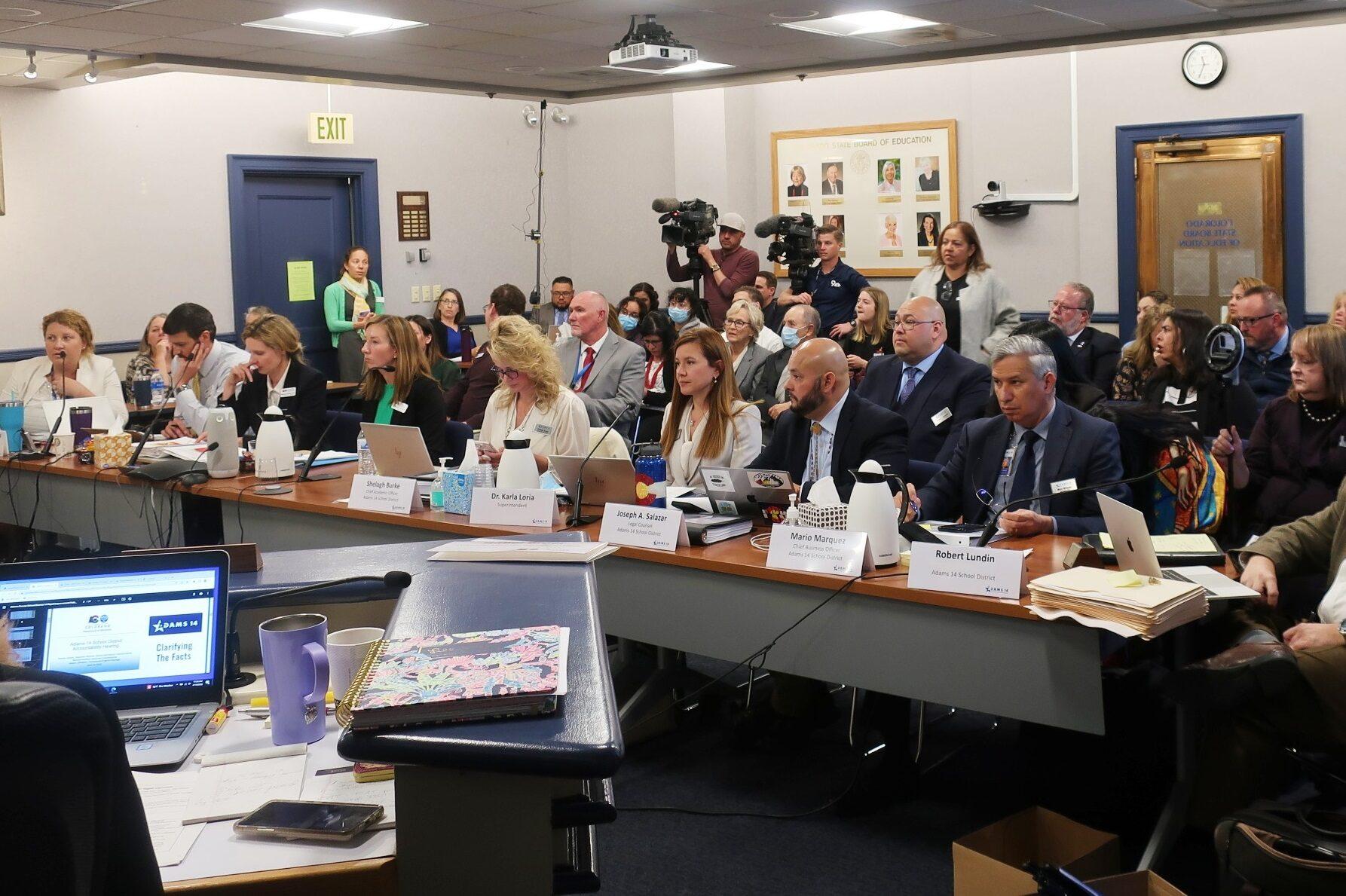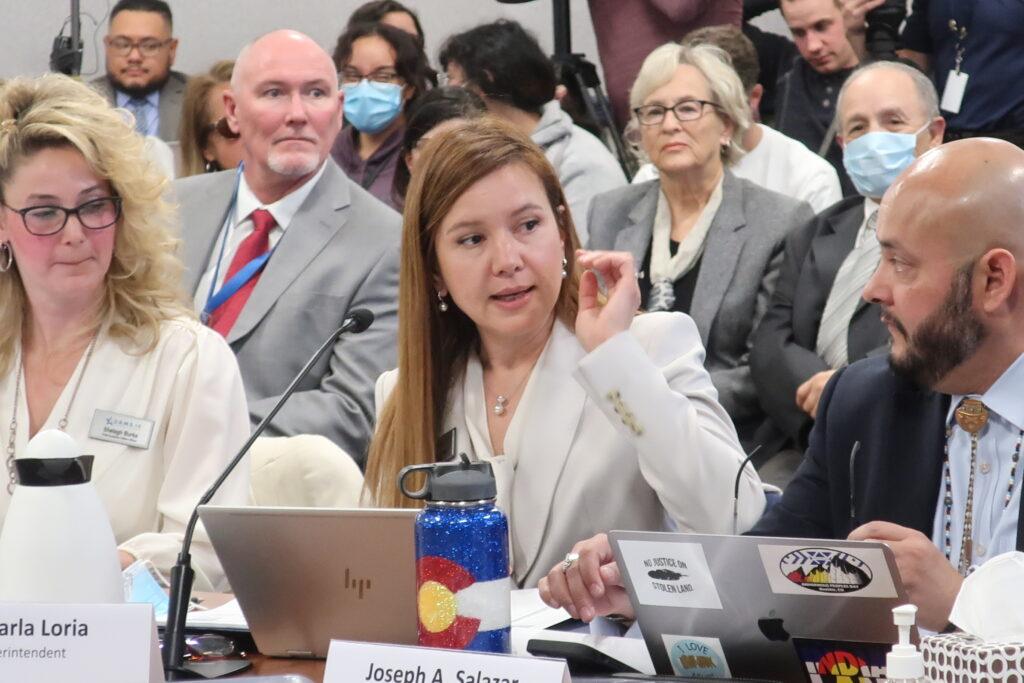
A small school district north of Denver has filed a lawsuit in district court challenging a State Board of Education’s order that it reorganize — and possibly be dissolved or absorbed by other districts. It charges that the state's accountability system — the rating of districts based on test scores — is systemically racist and that the order is an unconstitutional attack on the state’s system of locally controlled school districts. The complaint is the first court challenge by a school district to test the state’s 2009 accountability law.
The teacher’s union representing Adams 14 educators also joined the lawsuit. As a result of the Board’s order on May 24, a large number of teachers and staff have resigned from the district and students have left or will leave the district, according to the lawsuit. It also claims the order interferes with the collective bargaining agreement between the district and union.
Adams 14 was ordered last month by the State Board of Education to reorganize after years of low academic performance. That put into motion a process that could potentially see the district dissolved, annexed or consolidated. The board also stripped the district of its accreditation, which the suit said led to Moody’s downgrading the district’s bond rating.

While Colorado can’t directly take over the operations of a local school district, the board of education can direct a district’s improvement plan after a school or district has had low ratings for more than five years. Adams 14 had posted 12 years of low ratings on the state’s accountability clock.
The state ordered the district to hand over control to an external manager in 2018, but a local school board maintained ultimate authority. Eighty percent of the district’s students then couldn’t do work on grade level. Since that time, the district’s turmoil amplified as a power struggle between the outside manager MGT Consulting and local district officials and school board ensued.
From the Adams 14 suit against the state“Never in Colorado’s history has the State Board used its ‘general supervision’ authority to order a constitutionally created public school district ... to reorganize and dissolve."
The complaint includes 12 claims for relief. One is a constitutional challenge concerning the way the state board has applied the state’s accountability law against school districts like Adams 14. Colorado relies on a system of locally controlled school boards.
"This complaint is a line in the sand against an extremely abusive state agency that thumbs its nose at local control," said Joe Salazar, Adams 14 chief legal counsel. "A local school district's constitutional right to local control has been a mainstay of Colorado law for decades … Every school district in Colorado should be watching this lawsuit as we are fighting for them and their local control."
A fight over local control
According to the suit, the board unconstitutionally restricted the district’s local-control powers. It argues that when the state board ordered the district to be managed by an outside partner, it didn’t spell out the constitutional limitations to that arrangement. The lawsuit says neither Colorado law nor the state constitution permit the state board to require a district to delegate all formal decision-making to an outside entity.
District leaders call the order “discriminatory” in that it targets school districts that serve large numbers of low-income, non-English speaking students of color. Those districts are far more likely to be placed on the state’s accountability clock than districts that serve predominantly affluent, white, English-speaking students. More than 90 percent of Adams 14’s 5,700 students are students of color and more than half are learning the English language.
A central argument in the lawsuit is that the state board “arbitrarily sets cut points” for the standardized tests. That means a certain number of districts rate in the lowest two categories.
“This subjective decision guarantees that districts, like Adams 14, are labeled with failing ratings,” the suit reads. It said the rating system fails to take into consideration poverty, ethnicity, language barriers, and the high mobility of less affluent students.

Outside of the court, the Westminster school district made a similar challenge to the board, that the system fails to account for the greater challenge disadvantaged students face.
In addition to constitutional challenges, Adams 14 alleges that the state board has abused its statutory authority and engaged in arbitrary and capricious conduct.
“Never in Colorado’s history has the State Board used its ‘general supervision’ authority to order a constitutionally created public school district with constitutionally derived local control powers to reorganize and dissolve,” the suit states.
The court challenge charts unknown territory and could pose a complex political challenge to the state’s authority. The district’s neighbors – Mapleton, 27J, and Adams 12 Five Star school districts – are supposed to be engaging in the reorganization process including developing a new plan for the district’s boundaries as directed by the board’s order.

According to the suit, none of those districts have agreed to the reorganization process and have all notified the board that they oppose its order. The suit claims that these districts are being forced to reorganize despite not being a party in the board’s case against Adams 14.
A dozen metro districts argued in a June letter to the state board that the answers to Adams 14’s troubles lie within the district itself. Along with the local control argument, several districts have criticized the accountability system as being significantly flawed for a number of reasons. One of those is that it rates schools on results from standardized tests administered only in English, often taken by students who speak primarily Spanish.
State lawmakers ordered an audit of the accountability system to evaluate its fairness and whether it helps or hurts, in particular, low-income students of color. Those results are expected in December.
The district anticipates that litigation on the matter may take more than a year. The Colorado Department of Education said it doesn’t discuss ongoing legal matters, but provided a statement.
“The State Board of Education has followed their obligations to intervene in a struggling district as statute dictates,” it said. “We look forward to exploring the district’s concerns with the court.”
Meanwhile, the district just signed a three-year contract with a new external manager, the New-York-based nonprofit TNTP. A temporary partial external manager is required under the state’s order as the process to determine the district’s ultimate fate gets underway.
- May 10: Adams 14 loses accreditation as state education board votes to reorganize school district
- April 18: 'Don’t make it worse': This is how Adams 14 students pleaded with Colorado to keep their schools open
- April 14: Colorado Board of Education likely to restore some control of Adams 14 to the superintendent and local school board
- April 13: Adams 14 parents feel ignored as the state board decides the district’s fate









